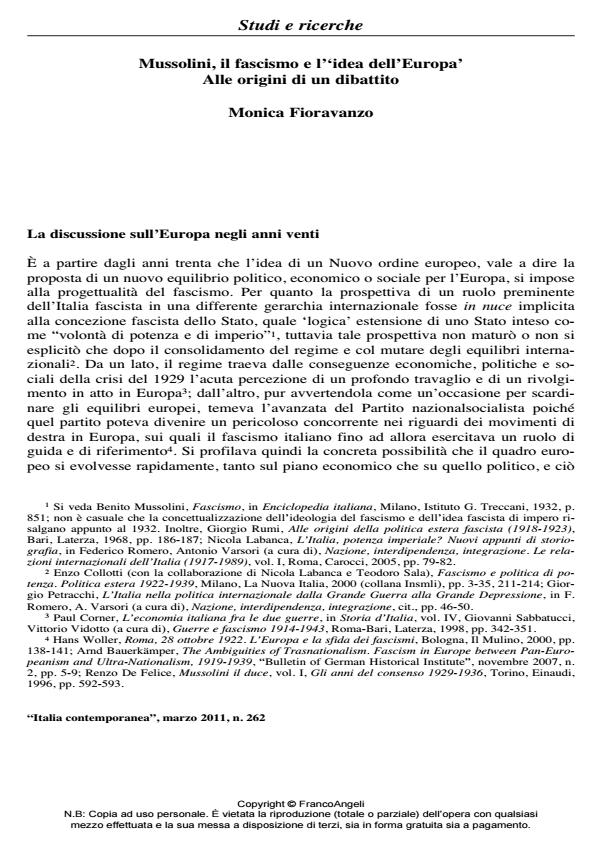Mussolini, Fascism and the ‘idea of Europe’. At the origins of a debate
Journal title ITALIA CONTEMPORANEA
Author/s Monica Fioravanzo
Publishing Year 2011 Issue 2011/262
Language Italian Pages 21 P. 7-27 File size 182 KB
DOI 10.3280/IC2011-262001
DOI is like a bar code for intellectual property: to have more infomation
click here
Below, you can see the article first page
If you want to buy this article in PDF format, you can do it, following the instructions to buy download credits

FrancoAngeli is member of Publishers International Linking Association, Inc (PILA), a not-for-profit association which run the CrossRef service enabling links to and from online scholarly content.
Only along the Thirties Fascism, pressed between the consciousness of the European crisis and the advance of National-Socialism, whose competition he feared, developed a project of New European Order. With such a proposal, the fascist regime intervened in a discussion on Europe that since the Twenties had been involving such eminent personalities as Briand or Coudenhove-Kalergi, and several intellectual movements, from Paneuropa to Mitteleuropa and Abendland. The beginning of the debate in Italy coincided with the celebration of the regime decennium in 1932, the myth of imperial Rome being then put forward as the guiding light of the international mission of Fascism. Most of all, it was the Volta Conference on Europe, in November 1932, organized by the Royal Academy of Italy under the sponsorship of Mussolini, that gave international resonance to the project of a fascist Europe. By examining the most relevant papers, the A. points out the peculiar features of the fascist designs, marking their distance not only from the liberal-democratic outlook but also - more significantly - from the Nazi idea of Europe proposed by Rosemberg, who of the New fascist order challenged the very core, i.e. the right and heritage of Rome.
Keywords: Volta Conference, myth of Rome, Alfred Rosenberg, New European Order, Fascist Europe project, the Thirties
- Cosmopolitanism, Nationalism and Hegemony: Antonio Gramsci’sPrison Notebooksand the European Crisis Fabio Frosini, in International Critical Thought /2017 pp.190
DOI: 10.1080/21598282.2017.1316679
Monica Fioravanzo, Mussolini, il fascismo e l’‘idea dell’Europa’. Alle origini di un dibattito in "ITALIA CONTEMPORANEA" 262/2011, pp 7-27, DOI: 10.3280/IC2011-262001